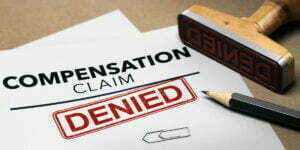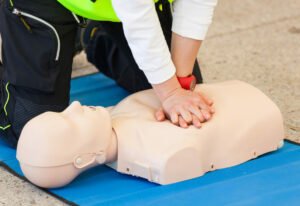If you or someone you love has suffered from an injury at work, you may be entitled to compensation. Unfortunately, some insurance companies deny workers’ comp claims because they don’t want to pay out large amounts of money. This article explores the top reasons why your workers’ comp claim can be denied.

Workers Compensation can cover a wide range of injuries and illnesses that occur on the job. However, not all cases are approved by insurance companies. There are many different reasons why your claim could be rejected. Some common reasons include:
This includes injuries suffered while playing sports, participating in hobbies, or engaging in other activities unrelated to employment. Some states have special rules about whether an injury occurred on the job if the worker was using tools or equipment provided by his employer. For example, if a worker slips and falls on ice outside of work, he might not qualify for workers’ comp benefits even though his fall was caused by the slippery conditions on the company’s premises.
In many cases, this means that the accident happened when the employee was off-duty, such as after work hours or on weekends. However, there are exceptions. For instance, if a worker is injured while traveling to or from work, or if he suffers an injury while performing duties required by law, these events will usually be considered part of the course of employment.
For example, the injury must be serious enough to prevent the worker from returning to his former position. It also has to be shown that the injury resulted in medical bills exceeding a stated amount. In some cases, you may also not be covered by state law. In some states, certain types of injuries are excluded from coverage.
Many people assume that if they receive medical care, they automatically qualify for benefits. But this isn’t always true. A worker might receive medical attention but fail to follow up with the doctor’s recommendations. Or he might seek help from a specialist only to find out that the condition doesn’t require treatment beyond what he already receives at the primary care facility.
According to federal regulations, any injury that occurs at work should be reported immediately. If not, there will be what is called “failure to give notice.” Failure to give notice means that you did not tell your supervisor about your injury within 30 days of its occurrence. If you wait more than 30 days to file a claim, you can still recover benefits, but you’ll need to prove that the delay was justified under the circumstances.
If you have an injury that happened before you began working with this employer, and your injury has nothing to do with an injury by accident in the workplace.
Filing a false workers’ comp claim can result in criminal penalties and civil lawsuits against you. Make sure that all information given to your attorney is accurate and complete. Also, make sure that you don’t give her any misleading information. This includes things like dates, times, and places.
This is one of the most common reasons why claims are denied. Most states set minimum periods of time that employees must work before being eligible to receive benefits. Usually, this period ranges from six months to two years but again, it depends on what is set by the state. Be mindful of how much time you have been working when you apply for benefits.
Seasonal workers are sometimes not eligible for benefits.
Nonetheless, this does not mean that you cannot get benefits. Many states allow seasonal workers to receive benefits even though their employment is limited to a particular season. If you’re a seasonal worker, check with your local office to see whether you qualify for benefits.
When an employee files a workers’ comp claim, the employer may deny responsibility for the accident. The denial may come in a variety of forms: denying that the incident ever happened, claiming that no negligence occurred, or arguing that the injury wasn’t caused by the job.
Whatever form it takes, the employer may try to avoid having to pay benefits by making these arguments. This is because they know that if they admit fault, they’ll have to compensate the injured party. However, this doesn’t always work. In some cases, the court might find that the employer had knowledge of the risk involved and therefore is responsible for the injuries.
You can also fight back by proving that the employer’s actions were negligent. Negligence involves doing something wrong that causes harm to another person. In other words, it’s the opposite of “doing nothing wrong.”

When your workers comp claim is denied, there are some steps you could take. These include:
Contacting the insurance company is very important if your claim ends up being denied. You may have a lot of questions that the insurance company may be able to assist with. You can ask them about your rights as well as how to appeal the decision. You can also ask whether the denial was based on lack of coverage or lack of proof. If the answer is the latter, ask what additional evidence would be necessary to support your claim.
Sometimes mistakes get made that you do not notice. Mistakes can be made through human error or poor record keeping. This is especially true when medical records are transferred from one facility to another. It’s possible that you did everything right but the insurance company didn’t realize that you qualified for benefits. Make sure that all of your paperwork is complete and accurate.
To do this, make copies of any documents that you think will be helpful. Then keep those copies safe so you don’t lose them. You should also make copies of any notes that you took during your treatment. You should be as careful and critical as possible when it comes to your paperwork.
It’s possible that you have grounds for appealing the decision. However, you may not always know what grounds those are or how you can defend them. In this case, you may want to consider hiring an experienced workers’ comp lawyer who knows how to appeal denials. A good attorney can help you prepare the best case possible. He or she can explain clearly why your claim has been denied and he or she can also advise you on how to proceed after the appeal is filed.
If your claim has been rejected because of insufficient evidence, you could hire an experienced workers’ compensation attorney. An experienced workers’ comp attorney can help you evaluate your chances of success. That attorney could first and foremost help you decide whether you need to file a lawsuit. He or she will also be your guide on every step of the process.
If you’re injured while working, you might be able to collect damages from your employer through a third-party claim. Third-party claims are separate from workers’ comp claims. Instead of getting paid directly by your employer, you’d pay your own attorneys to pursue your claim against whoever is responsible for your injuries.
You should certainly consider it if your claim has been denied. A good workers’ comp lawyer will make sure that your case gets fully investigated and that all relevant information is presented.

When you receive the letter that your claim has been denied, one of the first things you might feel is confusion . The letter doesn’t tell you exactly why your claim was denied. And it doesn’t give you details about how to appeal.
Your lawyer can help you understand the denial letter and answer some questions like these:
• What does the letter mean?
• How long does it take to hear back?
• Is there anything else I need to do?
You may be entitled to appeal the denial. If you believe that you were wrongfully denied benefits, you should talk to your workers’ comp lawyer about appealing the denial. Your lawyer can help you determine whether you have grounds for appealing and how to go about doing so.
An experienced workers’ comp lawyer can help ensure that your case is prepared properly. For example, your lawyer can help you gather any medical records that support your claim and present them to the judge. He or she can also help you prepare your testimony.
Once you’ve appealed your claim, you’ll likely have to wait for the outcome before you start receiving payments again. If you want to know what happens next, you should contact your lawyer. He or she can explain everything to you and keep you up to date on the status of your case.
After you’ve received payment for your injury, you may be eligible for additional compensation. This includes disability payments and vocational rehabilitation services. You should speak to your lawyer if you think you qualify for more than what you’ve already been awarded.
The workers’ compensation system was designed to protect injured employees from losing their livelihood because of an injury. Unfortunately, many people don’t understand the process and end up having their claims denied.
This is where we come in. We have seen thousands of claims denied over the years and know exactly what to look for. We can help you avoid these common mistakes.
Contact us now to find out more.
Personal injury claims are a common type of case that many people face at some point in their lives. The following article will help you understand how personal injury claims work so that you know what to expect from them. It will also provide you with information in understanding the types of personal injury claims in North Carolina.
A personal injury is any harm or damage caused by another person’s negligence, carelessness, recklessness, or other wrongful act. This can include physical injuries such as broken bones and cuts, emotional distress, loss of income due to medical expenses, and more.
The most important thing about personal injury cases is that they can be very complicated and involve multiple parties. For example, if a driver hits your car while driving on the road, this could qualify as a personal injury case. If you were injured because of someone else’s negligence or wrongdoing, then you may have a valid personal injury claim.
The following is a brief overview of some of the most common types of personal injury claims that occur in North Carolina:

Automobile accidents can be caused by many factors, including driver error and mechanical failure. If you were injured as a result of an automobile accident, it is important to determine who was at fault for causing the accident.
It may also be necessary to determine whether your injuries qualify for compensation. In addition, if you have been involved in an auto accident with someone else’s vehicle, you may be able to recover damages from the other party’s insurer.
Motor vehicle accident cases arise when drivers fail to obey traffic rules or drive recklessly. Motor vehicle accidents can cause many types of injuries which can range from minor cuts and bruises to broken bones and head trauma. If you were involved in a motor vehicle accident, you may have grounds based on negligent driving to pursue compensation for your losses.
A medical malpractice claim involves negligence on the part of a health care provider. Health care providers must meet certain standards when providing services to patients. For example, they must exercise reasonable care, skill, and diligence in treating their patients. They must provide appropriate treatment and follow up after each patient visit.
When health care providers make errors, these errors can result in unnecessary suffering, permanent disability, or even death. If you believe that a doctor or nurse failed to meet these standards, you may have grounds for filing a medical malpractice claim against them.
If you were bitten or attacked by another person’s dog, you may be entitled to file a civil lawsuit against the owner of the dog. You will need to prove that the dog had vicious propensities, such as attacking without provocation. This type of case is referred to as a “vicious animal” action.
Premises liability refers to lawsuits arising out of injuries sustained on someone else’ s property. Examples of common premises liability claims include slip and fall incidents, trip and falls, and animal attacks. If you were injured because of unsafe conditions at a business, restaurant, or public place, you may have grounds under premises liability laws.
The owner of the property might owe you a duty of care based on his or her status as the landowner. For example, if you slipped on ice while walking through a parking lot owned by a grocery store, the store owner would likely owe you a duty of ordinary care. However, if you fell down an icy stairway located inside the building, the owner of the building would probably not owe you any duties of care.
Products liability cases involve injuries resulting from defective products. A product defect exists when a manufacturer or seller has created a product that does not perform as intended. Many times, a product defect results from faulty design or manufacturing. Other times, defects arise from problems during distribution or use. If you were injured due to a defective product, you may have grounds to file a products liability claim against the manufacturer of said product.
Wrongful death occurs when someone dies as a direct result of another person’s negligent act, omission, or breach of contract. Most states allow family members to bring wrongful death claims on behalf of deceased individuals. These claims are often filed by survivors of the decedent. However, some states allow only the decedent’s estate to pursue wrongful death claims. For example, if a driver negligently struck and killed a pedestrian, the driver’ s estate might be held liable for damages.
Nursing home abuse occurs when nursing home employees mistreat residents or fail to provide adequate care to residents. This includes neglecting basic needs, such as food, clothing, and shelter. It also includes physical abuse, sexual assault, and psychological manipulation. If you believe that a nursing home employee harmed a resident, you may have grounds in a nursing home abuse case.
Construction site accidents refer to injuries that occur while working on construction sites. Common causes of construction site accidents include falling objects, electrocution, and machinery malfunction. If you were hurt during a construction project, you may have grounds to file a personal injury claim.
The statute of limitations for personal injuries varies depending upon where the accident occurred. In North Carolina, the statute of limitations for personal injury cases is three years from the date that the injury happened to the date that the injured person goes to the court and files the lawsuit. An exception to this is when the incident results to death in which case the statute of limitations is at 2 years.
If you do not file your lawsuit within the time limit specified by law, then the courts will dismiss or may not even accept your case. The statute of limitations is very important because it protects defendants from having to defend themselves in lawsuits that are too old.
A personal injury claim can be settled for many different amounts. Some settlements are based on the amount of medical bills incurred, lost wages, pain and suffering, etc. However, most settlements are based on the value of the loss suffered by the victim.
For example, if a car hits another vehicle causing damage to both vehicles, the owner of the damaged vehicle may sue the other driver for compensation. If the other driver has insurance coverage, then the insurance company will pay the full amount of the damages. If the other driver does not have insurance, then the owner of the damaged car may sue the other driver.
There are several types of compensation that can be recovered in personal injury cases. These include:
Medical expenses can be recovered for treatment of physical injuries caused by the accident. Examples of these include hospital bills, doctor fees, ambulance services, and prescriptions.
Lost wages can be recovered for the period of time during which the victim was unable to work due to the accident.
Loss of consortium refers to the loss of companionship and affection that occurs when one spouse loses the ability to engage in sexual relations with the other spouse.
Loss of enjoyment of life refers to the inability to enjoy normal activities such as hobbies, sports, and social events.
Property damage can be recovered for damages done to property owned by the victim. Examples of this include cars, homes, and businesses.

Yes, you should consider hiring a lawyer for your personal injury case. A lawyer can represent you in court and negotiate a fair settlement. He or she can also ensure that you receive full compensation for your injuries.
Aside from that, a lawyer will be able to help you with all aspects of your case including:
• Negotiating a settlement;
• Preparing for trial;
• Finding expert witnesses;
• Obtaining medical records;
• Investigating the cause of the accident;
• Collecting evidence;
• Asking questions at depositions;
• Making sure that you get paid;
• Working with insurance companies;
• Drafting legal documents;
• And more
You should start looking for an attorney who specializes in personal injury cases. You can search online for attorneys in your area using Google or Yahoo. You can also ask family members, friends, coworkers, neighbors, and others about their experiences with lawyers.
The next step is to visit the websites of local bar associations. These sites usually list the names of lawyers who practice in your area. You can contact these lawyers directly to inquire about their qualifications and experience.
Once you have identified several potential candidates, you can begin interviewing them. Ask them about their background, education, training, and experience. Make sure they understand the type of case you are dealing with. Finally, make sure that you feel comfortable with this particular lawyer before hiring him or her.
Oxner + Permar has lawyers that specialize in representing clients in personal injury claims. We know how important it is to receive the maximum compensation possible after being injured due to someone else’s negligence. That is why we work hard to provide our clients with the best representation available. Our team of highly skilled lawyers will fight for you until we achieve the results you deserve.
To learn more about Oxner + Permar, please call us today at 1-800-319-9000 or email us at [email protected].
Motorcycles are fun vehicles to ride around town or take out on the highway. They offer great freedom and mobility, but they also carry risks. If you want to enjoy riding motorcycles without facing serious injuries, then you need to follow some basic safety rules. Read on to know tips on how to avoid motorcycle accidents as well as what you can do if you are still involved in one.

Riding a motorcycle is a thrilling experience, but it also comes with its share of dangers. According to the National Safety Council (NSC), motorcyclists account for 14% of all fatal crashes. In addition, they are responsible for a significant number of nonfatal accidents.
Nonetheless, whether resulting to fatal or nonfatal incidents, the most common causes for motorcycle accidents include:
The distance between a motorcycle and another vehicle is of great importance. When a motorcyle rides or passes another vehicle too closely, this can result to various types of collision.
When two cars collide, the driver of the car coming from behind usually has the advantage in this type of collision. However, if you’re driving faster than the car in front of you, you can easily get into trouble.
As such, when you drive your motorcycle, always keep a safe distance between yourself and any other vehicle. This will help ensure that you don’t end up in an accident.
Driving your bike during nighttime hours may seem like a good idea because there are fewer people on the road. But, this doesn’t mean that you should be reckless while doing so.
At night, the visibility of objects is reduced, which makes it harder for drivers to see you. This means that you have to pay extra attention and be aware of your surroundings while driving at night, especially if there are no streetlights or signs along the road.
You should always drive defensively so that you don’t end up crashing into something, like a tree or telephone pole.
Helmets are very important when riding motorcycles. Wearing them helps protect your head from injury, reduces the risk of getting a concussion, and keeps you safer.
If you’re not wearing a helmet, you could end up suffering severe brain damage or even death. So, make sure that you wear your helmet whenever you ride your motorcycle.
Speeding is dangerous not only for motorists, but also for riders. It increases the chances of getting into an accident.
Speeding is dangerous for many reasons. First, speeding can lead to serious injuries if your motorcycle collides with other vehicles or objects. Second, speeding increases the risk of getting into an accident. Third, speeding can increase the likelihood of being involved in a fatal crash.
Alcohol is a major cause of motor vehicle crashes. People who drink alcohol have impaired judgment and reflexes, and they often drive at higher speeds than normal. They may not notice that their car has drifted into another lane, or they may fail to brake properly.
Regardless of how much alcohol you consume, you shouldn’t be driving your motorcycle after consuming more than 0.08 blood alcohol content (BAC).
Roads aren’t always perfect. Sometimes, they become slippery due to rain or snow. As such, it’s best to avoid driving your motorcycle on roads that are wet or icy.
This is especially true if you’re traveling at high speeds. You need to slow down as soon as possible if you spot ice or water on the road.
Distracted driving is a big issue among motorcyclists. Distracted driving is one of the leading causes of accidents. When you’re distracted, you’re less likely to respond quickly to danger signals.
Distracted driving includes anything that takes away from your attention from the road ahead. Examples include eating, drinking, using a mobile phone, adjusting the radio, or talking to passengers.
It’s very important to keep your bike well maintained. For example, your tires should be properly inflated and your brakes checked regularly. You should also check your lights and turn signals every time you get on your motorcycle.
Driving recklessly is dangerous because it puts you and other drivers at risk. Reckless driving includes things like speeding, running red lights, failing to yield right-of-way, tailgating, reckless driving, and racing.
Laws, including traffic laws, are made for a reason. Traffic laws help ensure that all drivers obey the same rules. This makes it easier for police officers to catch offenders.
If you break any traffic laws, you could face fines and even jail time. In addition, you could be charged with a crime if someone gets hurt or killed as a result of your actions.

Motorcycle accidents are common. They cause serious injuries and even death. If you ride a motorcycle, you should take precautions to ensure your safety. Here are some simple ways to stay safe on the road.
Drivers who aren’t paying attention tend to cause crashes. If you notice that someone else isn’t looking out for themselves, try to slow down or move over. You could even pull off the road and let them pass first.
Lights are important because they give other drivers warning that you are approaching. Using your lights correctly helps ensure that you don’t collide with another car or object.
You should turn on your headlights whenever there is poor visibility. This helps alert motorists around you about your presence so they don’t hit you.
Wearing proper gear is essential when riding a motorcycle. A helmet is required by law. Other items include gloves, boots, goggles, and earplugs. These prevent injuries and reduce the chance of becoming trapped inside your vehicle after a crash.
Helmets reduce the chance of serious injury in a crash by providing protection against severe head trauma. They can also prevent neck injuries and brain swelling. Helmets are required by law in most states.
When you’ve been driving too fast, you may not realize how much space you have between you and another car. Slowing down will allow you to react more quickly in case you have to brake suddenly.
Additionally, you should also know how to stop safely. Even though motorcycles are smaller than regular vehicles, they still weigh thousands of pounds. Stopping safely means slowing down as soon as you begin braking. It’s important to use both front and back brakes before bringing the bike to a complete stop.
Drivers need to pay attention to road signs and traffic signals. If you see people who are driving recklessly, you should avoid them.
It’s illegal to operate a vehicle under the influence of alcohol or drugs. Even small amounts of alcohol can seriously impair your judgement and reaction time.
Drinking alcohol lowers your reaction time. This increases your chances of getting into a crash. In addition, drinking alcohol affects your judgment. Driving under the influence also puts you at risk of injuring yourself or causing an accident.
Drivers need to be aware of conditions such as snow, ice, rain, fog, and darkness. When there are any such conditions, you should slow down so that you don’ t cause an accident.
Take Off-Road Training Courses
Motorcycles are designed for open spaces. If you want to take one off-road, you should take a training course first. You could get injured if you aren’t prepared for what might come next.
Pedestrians are especially vulnerable to being struck by motor vehicles. Drivers must watch for children playing outside, people crossing streets, and anyone walking along the side of the road.
Animals like dogs, cats, horses, and cows can often wander onto roads. When this happens, they can become frightened and run toward traffic. This makes them unpredictable and dangerous.
Every motorocycle is unique. You should know the features possessed by the motorcycle you own through the owner’s manuel which provides information about all the features on your motorcycle.
Knowing how these features work will save you money and increase your safety. You will also know how to repair your motorcycle if anything breaks.
If you own a motorcycle, you should pay close attention to its condition. Make sure that your tires are properly inflated, and that your brakes work correctly.
You should check your oil regularly, and replace it when necessary. You should also change your air filter every month.
As well, you should never drive faster than you feel comfortable doing. Doing so can lead to serious injuries or even death.
This includes also knowing and following traffic laws.

The best way to prevent an accident is to not have one in the first place. However, accidents do happen. If you do end up in a motorcycle accident, you may be able to recover damages from the other party.
However, you should contact an attorney right away. An experienced lawyer can help you determine whether you have grounds to file a lawsuit against the other driver.
An attorney can also help you negotiate with the insurance company to settle your case.
In some cases, the other driver’s insurance company may offer to compensate you for your losses.
If you need assistance from a lawyer, Oxner + Permar can help.
Our lawyers are highly skilled and experienced. They will fight hard for you and make sure you receive the compensation you deserve.
We’ll sit down with you and discuss your options. We’ll explain everything you need to know about the process and what to expect.
Call us today at 1-800-319-9000 to schedule your consultation.
Employers must provide a safe working environment for their employees. There should be a written health and safety plan available for everyone to read and understand. Workplace safety is important, especially for those who work at construction sites or other places where they might come into contact with dangerous materials or machinery. To educate both employers and employees about some basics of workplace safety, this article provides a Workplace Safety 101.
There are many hazards associated with working in a workplace environment. These include slips, trips, falls, burns, cuts, and even explosions. The Occupational Safety and Health Administration (OSHA) has strict rules regarding workplace safety. If you want to ensure that your workplace is safe, then you should follow these guidelines.

Here are some basic steps to ensure workplace safety.
Before you start working, it’s best to know what the rules are. You can get this information from your employer or by contacting OSHA directly. They will be able to tell you about any laws that apply to your job.
If you don’t already know how to work safely, then you need to learn. There are classes available through your local community college or vocational school that teach you everything you need to know about workplace safety. Some of these courses include:
You should always be aware of your surroundings when you are working. This means being aware of potential dangers such as power lines, moving parts, sharp objects, and other hazardous items. It also means knowing how to react in case something happens.
Practice proper procedures befor using equipment. Make sure you understand how to operate all machines properly. Also, practice operating equipment such as drills, saws, ladders, etc., on a regular basis.
Make sure that you keep yourself safe while working. Wear appropriate PPE, including gloves, boots, eye protection, and hearing protection. Don’t forget to put on your hard hat!
If you see anything unsafe or out of place, report it immediately. Do not try to fix problems yourself, but instead call someone else to help.
Stay alert at all times. Take breaks regularly to avoid fatigue. Use common sense when doing tasks, and pay attention to warning signs.
Follow all policies set up by your employer. Remember that you are responsible for following all safety regulations.
Alcohol affects judgment, coordination, and reaction time. This makes it difficult to perform certain jobs safely.
Have fun while working. Enjoy your job and don’t let safety become a chore.
Employers have a legal duty to oversee the health and safety of their employees. This means that they must make sure that any risks, including workplace violence, are eliminated or reduced to protect the well being of everyone involved. To do this, employers need to have a written health and saftey policy in place that is made clear to all employees. Risks are identified as hazards. Hazards are controlled by implementing procedures and training. Procedures are written down and communicated to employees. Training is carried out when new workers join the company or after changes are made to the work environment.

To ensure that employees are protected from all risks, employers must follow certain guidelines. These include:
The first step towards reducing or eliminating risk is identifying it. The more risks you identify, the easier it will be to eliminate them. You can use a risk assessment tool like OSHA’s Risk Assessment Tool to help you identify risks.
Once you have identified a risk, you need to control it. This involves controlling the amount of exposure to the risk. For example, if there is a chance that a worker could get hurt during a task, then you would want to reduce the chances of injury occurring. This may mean changing the way the task is performed or providing additional safeguards.
Once you have controlled the risk, you need to eliminate it completely. This may involve changing the way the task works or replacing an item with one that is safer.
Finally, once you have eliminated the risk, you need to reduce it further. This may involve making the risk less likely to happen again. It also may involve taking steps to prevent future harm.
You should record your results in a form called a “risk log”. This helps you track how effective your actions were in reducing or eliminating the risk. You should also record what happened during each incident so that you can learn from mistakes.
It is important to communicate the results of your efforts to other people who might be affected by the risks. This includes communicating the results to management, co-workers, customers, and the public.
Your processes should be reviewed regularly. This ensures that they remain up to date and that they continue to be effective.
If you find that your current procedures aren’t working, then you need to change them. This may involve updating policies or training materials.
Take immediate action when someone gets injured or suffers property damage as a result of a safety violation. This lets you know that your procedures are working. It also lets you know which areas of your business require improvement.
Follow up on incidents immediately after they occur. This gives you the opportunity to determine whether your procedures worked. If they didn’t, then you can take corrective action before something worse happens.
Employers must report certain types of incidents to OSHA. The most common ones are listed below.
An occupational injury or illness occurs when an employee gets hurt while working. Examples include slips, trips, falls, burns, cuts, bruises, sprains, strains, concussions, and poisonings.
A hazardous condition exists when an employer fails to provide a worker with a safe environment. Examples include poor lighting, slippery floors, exposed machinery, and high places.
Recordkeeping violations occur when employers fail to keep records that would allow them to comply with OSHA regulations. Examples include not keeping records of injuries, illnesses, and deaths; not keeping records of safety programs; and not maintaining accurate records of work hours.
Failure to pay overtime wages occurs when an employer pays less than time-and-a-half for hours worked over 40 per week.
Discrimination happens when an employer treats one person differently from others because of race, color, religion, sex, national origin, age, disability, sexual orientation, gender identity, veteran status, genetic information, or any other protected characteristic.
Retaliation refers to actions taken against an employee who has filed a complaint or otherwise protested discrimination.
Unfair labor practices refer to actions taken against an employer by the National Labor Relations Board (NLRB). They include refusing to bargain collectively, threatening strike action, locking out employees, and failing to make required contributions to employee benefit plans.
Wage and hour law violations are those that occur under the Fair Labor Standards Act (FLSA), which sets minimum wage standards, requires overtime pay, prohibits child labor, and establishes recordkeeping requirements.
Hazardous substances are chemicals that pose a risk to human life if they come into contact with skin or eyes. Some examples of these substances include asbestos, benzene, formaldehyde, lead, mercury, silica dust, solvents, and vinyl chloride.
Sexual harassment occurs when someone uses his or her power or authority to take advantage of another person sexually.

Injured workers have several rights under federal law. These rights help protect their health and financial security in the event that they become ill or injured at work.
The first step toward receiving compensation is filing a claim with your state’s workers’ comp agency. This process usually takes about two weeks. Your employer must then send you a written notice stating what happened and why it was necessary to file a claim. You will also need to complete forms called “Authorization for Treatment” and “Report of Injury or Illness.” Once this paperwork is completed, your claim can begin.
If you are unable to return to work after being hurt on the job, temporary disability insurance provides income while you recover. The amount of coverage depends on how long you are off work. Coverage typically lasts three months unless you ask for more time. After that, you will need to apply again for additional coverage.
If you cannot perform your regular duties due to an injury or illness, long term disability insurance helps cover medical bills. It does not replace lost earnings but instead replaces a portion of your salary. To qualify for this type of coverage, you must meet certain criteria, such as having worked for your current employer for at least 20 years.
Life insurance pays your family members if you die. There are different types of policies available, including whole life, universal life, variable life, and indexed universal life. Each type has its own advantages and disadvantages. Talk to your agent about which policy would best suit your needs.
Short-term disability insurance covers your income during your recovery period. If you lose your job because of an injury, you can collect up to 60% of your average weekly wages per month.
Health savings accounts allow people to set aside money from each your income if you are temporarily disabled and cannot work. If you lose your job, you can continue to collect short-term disability payments until you find new employment. However, most employers require you to wait six months before collecting any money from this source.
Pension plans provide retirement income to employees who have been working for many years. They are similar to 401(k) plans except that they do not offer tax breaks. Instead, pension funds are funded by contributions made by both the employee and the employer.
Social security benefits range from $1,000 to $2,400 a month depending on your age and past wage history. People who were born between 1928 and 1938 may be entitled to higher benefits. Benefits increase every year based on inflation.
Unemployment insurance (UI) is paid directly to individuals when they lose their jobs through no fault of their own. UI ranges in length from 26 weeks to 99 weeks. Most states limit unemployment benefits to 52 weeks.
There are other types of insurance that can help protect your assets and pay out in case of emergencies. These include home owners insurance, renter’s insurance, car insurance, health insurance, and umbrella liability insurance.
Every worker should know what his/her rights. You should know that there are laws that govern workplace safety. For example, OSHA regulates workplace safety and requires employers to follow certain rules. Employers also have a duty to provide workers with a safe place to work. This means that they need to make sure that all equipment and materials used in the workplace are safe. They also need to ensure that workplaces are free of hazards.
If an accident happens, then the injured party can file a lawsuit against the company responsible. The law allows workers to receive compensation for injuries sustained while performing their jobs. In addition, employers are required to provide workers with proper training and information so that they will understand how to avoid accidents.
You should always ask your supervisor or manager for advice about workplace safety. He/she might even give you some tips on how to stay safe at work.
In some cases, employers fail to comply with workplace safety regulations. When this occurs, it is called “negligence”. Negligence is when someone does something wrong without intending to harm anyone. It is usually unintentional.
When negligence takes place, the person who was harmed has the right to sue the negligent party. There are two ways to bring a lawsuit. First, the victim can take the matter to court. Second, he/she can go to arbitration. Arbitration is a process where a third-party decides whether or not the employer was negligent. If the arbitrator finds that the employer was negligent, then the victim gets money as compensation.
The victim must prove that the defendant had enough knowledge about the risks involved in the job. However, the victim cannot sue the employer for damages unless he/she proves that the employer knew about the danger but did nothing to prevent the injury.
In order to get compensation for workplace injuries, you must first prove that the employer was negligent. To do this, you must show that the employer failed to provide a safe working environment. Once you have proven that the employer was negligent and that you were hurt because of this negligence, you can collect financial compensation.
Compensation includes medical expenses, lost wages, and possibly future medical expenses.
This depends on several factors such as the type of injury, the severity of the injury, the length of time the injury lasted, and the amount of time off from work. An experienced personal injury lawyer can help you determine how much you can expect to be paid.
Yes! You can sue your boss if he/she caused your workplace injury. Your boss could be liable for causing your workplace injury. However, you must prove that he/she was negligent. This means that you must show that the boss knew about the risk of the injury occurring and that he/she did nothing to prevent the accident.
Your boss may try to argue that he/she was not negligent. Therefore, you should consider hiring a qualified attorney to represent you.
If you want to learn more about workplace health and safety, please contact us today. Our office is located in North Carolina, but we serve clients throughout the entire state. Call us now at 1-800-319-9000 to schedule an appointment.
Working from home or remotely has been a growing trend over the past few years, and it is likely that this trend will continue as more people become comfortable with working from home.
If you are one of these people, it can be difficult to know what your rights are under workers compensation laws. It is important to understand how these laws apply to remote workers because many companies do not offer this benefit to their remote employees.
You may also have questions about how much you will receive if you become injured while working remotely.
This guide will help you with all these, especially in understanding Workers Compensation for remote employees in North Carolina.

Workers Compensation Insurance (WC) is designed to provide benefits to injured employees who suffer from job related injuries or illnesses.
The purpose of WC insurance is to compensate employees for lost wages and medical expenses incurred due to workplace accidents
In North Carolina, employers that employ three or more people are required to carry Worker’s Compensation Insurance. This means that they are responsible for paying certain benefits to their injured employees.
However, some employers do try to get around the rules by making their employees remote. Workers who work from home are still covered under workers’ compensation laws.
In fact, according to the North Carolina Industrial Commission, just because an employee is remote or formally labeled by their employers as “independent contractors”, that does not mean that their employers cannot be held liable for the injuries they end up suffering while working.
In other words, even though the employer might not want to pay out for the injury, the law says otherwise.
North carolina workers compensation should cover injuries that happen while working remotely. You need to prove that the injury was related to the job.
For example, if you are injured while doing housework or cleaning up after yourself, then you probably won’t qualify for workers’ comp. But if you are injured while performing a task that relates to your job, then you may be eligible for benefits.

Home-based workers may be eligible for workers’ comp if they’re injured while performing a job-related task or benefit their employer in some other way.
If you are injured while working from home, you must show that the accident happened while performing a duty related to your employment.
• Your injury has to be causally connected to your employment. This means that there had to be a direct causal connection between your employment and the occurrence of your injury.
• Your injury had to arise out of and in the scope of your employment. This means it had to happen while you were carrying out your job responsibilities. It also means that it had to be reasonably foreseeable that you would be required to carry out such tasks.
• Your injury had to be incurred during the course of your employment. This includes both on-the-job injuries and off-the-job injuries that occur while you are traveling to or from work.
• You must have worked long enough hours to be covered under the law.
• Your injury can’t be due to any willful misconduct on your part. This means that you didn’t intentionally injure yourself.
The main reason why we work from home is for flexibility. However, it also comes with risks. Make sure your employers know about your injuries and how they affect your ability to work. Also, make sure you document everything.
You should see a doctor as soon as possible after an accident occurs. The doctor should examine you thoroughly and tell you what he/she thinks happened. Make sure you do not miss any important information about your injury.
You can then file a claim with the North Carolina Industrial Commission (NCIC). The NCIC handles all claims filed by employees against their employers. When filing a claim, you have to provide proof that the injury occurred during the course of your employment.
Your employer has to give you permission before you file a claim. They may ask questions about how the injury happened, what caused it, and whether there were any witnesses.
The NCIC will investigate your claim and determine whether you are entitled to compensation. It will look into whether your injury qualifies as a compensable workplace injury. This means that your employer owes you money based on the injury.
The NCIC will also consider whether you are eligible for medical care. Medical treatment is usually covered by workers’ comp. However, if you receive medical care outside of North Carolina, you may be able to get reimbursed through the North Carolina Bureau of Health Services.
You may be able to recover lost wages due to your injury. Lost wages are generally paid through workers’ comp. Depending on the severity of the injury, you may be able recover future earnings.

There are several reasons why you might not be able to prove that you are entitled to workers’ comp benefits. Some common ones are:
This depends on many factors. If you are injured while working for someone else, you may only qualify for partial benefits. Partial benefits are paid for part-time work. These benefits are called “partial” because they cover only a portion of your income.
If you are injured while working at home, you may be eligible for full benefits. Full benefits are paid for total disability. Total disability means that you cannot go back to work.
In some cases, you may be able get both partial and full benefits. For example, if you are injured while working from home, you may be partially disabled and unable to work. At the same time, you may be fully disabled and unable to return to work.
If your employer does not offer workers’ compensation coverage, it is important to know what your rights are. The law requires employers with more than 3 employees to provide coverage. Your state’s Department of Labor has information about how to file a complaint against an employer who fails to comply with the law.
If you do not have access to any other type of health insurance, you can apply for Medicaid. This program provides free medical services to people who meet certain criteria. To find out if you qualify, contact your local Social Security office.
The first thing you need to know is whether or not you are going to receive any money. It is possible that you won’t be able to recoup all of your losses.
It is also possible that you will never be able to work again. This is especially true if you suffer permanent damage.
You may also want to consult a vocational rehabilitation counselor. He/she can help you determine whether or not you are capable of returning to work.
If you are a remote employee in North Carolina needing helping with your workers’ compensation claim, we can help you, just click here to connect.